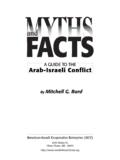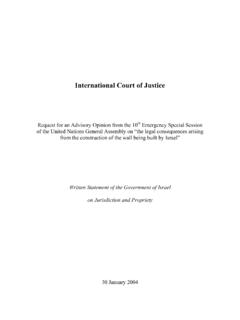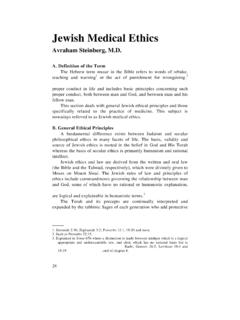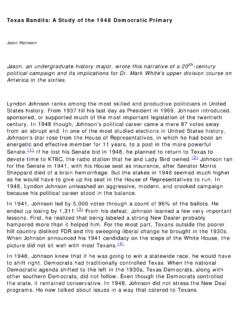Transcription of The Israeli-Arab War of 1948 - Jewish Virtual Library
1 Israel Studies: An Anthology - The israeli -ArabWar of 1948 [9/9/2009 4:54:17 PM]The Israeli-Arab War of 1948By Yoav Gelber(July 2009)Introduction: Significance and UniquenessThe long lasting interest in the war of 1948 has not emanated from its unique features as amilitary campaign. Rather, scholarly interest and public curiosity have stemmed mainly fromthe wider historical consequences of this war. These consequences include the emergence ofIsrael, its persistent existence as a spearhead of western civilization in the Middle East, theprotracted arab - Jewish conflict and the unsolved Palestinian problem. Other historicaltransformations also have causal links to this war and they include the disappearance of theancient Jewish communities in Muslim countries such as Yemen, Iraq and Egypt throughimmigration to Israel and elsewhere as well as political and social upheavals in the Arabstates and frequent changes of their global orientation after the arab - israeli war that broke out in 1948 has not yet ended.
2 The campaign did not resolveany of the problems that caused the war. Moreover, the outcomes of the military contestproduced newer and more crucial issues, such as the Palestinian refugee problem and thewavering status of Jerusalem. Every historical analysis of the 1948 war has had actualramifications and has often been interpreted and discussed outside its historical context andin terms of the continuing struggle at present. In this sense, the historiography of the arab Jewish conflict is as unparalleled and unprecedented as the conflict of the conflict focuses attention on its actual aspects and pushes aside itshistorical roots, increasingly dismissing them as irrelevant a highly mistaken approach. InWestern Europe, the United States and even in Israel, memory becomes shorter, patiencediminishes and propaganda competes successfully with historical knowledge.
3 In the post-modernist era it is hardly possible to discern between NarrativesA fundamental issue of the war s historiography has been the tension that has developedbetween contemporary israeli and arab myths that later became their respective warnarratives. These rival narratives stand in contrast to the findings of historical research. Anexamination of the contemporary and authentic israeli and arab archival sources wheresuch comparison is possible reveals narrow discrepancies between the original versions,but with the lapse of time, polemics have increasingly widened the first, one history existed, although it took on slightly different versions. Gradually, thissingle history has split into separate, opposing and conflicting narratives. In the process ofshaping them, the collective memories of Jews and Arabs have encrusted the war in a thickIsrael Studies: An Anthology - The israeli -ArabWar of 1948 [9/9/2009 4:54:17 PM]layer of fables, stereotypes, myths, polemics and apologies.
4 Now, the historian s task is tounearth the real war that hides behind and below these israeli story of the war was shaped during the military campaign and in its immediateaftermath, or under the shadow of the threat of a second round that hung over the MiddleEast for many years after the war. Incessant skirmishing along the armistice lines andongoing arab political and economic warfare against Israel created an atmosphere of siegethat naturally affected Jewish writing on the war. With few exceptions, 1950s and 1960sIsraeli historiography and fictional literature exalted the war as a miracle. To amplify theheroic achievement, israeli writers blamed Britain for covertly directing the Palestinianonslaught on the Yishuv (the Jewish community in Palestine) and the arab armies' invasionof Israel.
5 They condemned the British for attempting to obstruct Jewish statehood and,having failed to prevent the foundation of the State of Israel, to deny it the fruits of , theatre, films, fiction literature, school textbooks, popular songs, commemorativestatutes and books as well as political polemics molded war narratives before historicalresearch and writing had a chance to do so. Several narratives developed on each side: Ben-Gurion s version of the war differed from that of the israeli left-wing parties that stressed andeven exaggerated the contribution of Soviet assistance through diplomatic support and theprovision of war-material. The two military schools the Palmach and the British army sveterans had different views of the causes for military achievements. Even the Irgun (IZL)had a narrative of its own. Nonetheless, certain assumptions have been common to all Israelinarratives: A profound faith in the purity of Jewish arms, a deep-rooted belief of the Arabs enormous superiority in manpower and war material, a conviction of the Arabs determination to throw the Jews into the Mediterranean and finally the recollections of theArab leadership s call to the Palestinians to abandon their homes and its promises of a quickreturn to their places in the wake of the triumphant arab the arab side, each arab country as well as the Palestinians has developed its ownnarrative.
6 Until the end of the war, arab public opinion possessed only a vague idea of whatwas actually happening in Palestine. Through their control of the media, the governments didtheir best to conceal the military defeats that had led to the armistice agreements. WhileEgypt negotiated an armistice in Rhodes at the beginning of 1949 following a humiliatingmilitary defeat, a poll held by the popular Egyptian weekly Akhir Sa a revealed that 79% ofthe 20,000 sample believed that Egypt won the war against the Zionist gangs. Early arab writing on the war usually polemic or apologetic memoirs and only rarelyscholarly research assigned guilt rather than analyzed events. The authors exonerated theirown conduct, seeking to place elsewhere the blame for the calamity that has befallen thePalestinians and the responsibility for the Arabs defeat.
7 Since it was inconceivable that thetiny Yishuv routed singlehandedly the arab armies, it was essential to mitigate the disaster bysuggesting accomplices. The Arabs accused Britain of betraying them, blamed the UnitedStates for supporting the Zionists and denigrated King Abdullah of Transjordan, who was theonly arab ruler that benefited from the general usual, the Palestinians blamed everyone but themselves. In his recently published notesfrom 1949, Anwar Nusseiba the secretary, and later chairman of the Palestinian nationalcommittee of Jerusalem complained that the arab Legion was arab by name only andbecause of its British command could not implement an arab policy: Iraq was run by theBritish embassy and had an account to settle with the Palestinian leader, Hajj Amin al-Hussayni, for his role in Rashid Ali al-Kailany's putsch in 1941 and Syria and Lebanon weregrateful to Britain for ejecting the French and facilitating their independence.
8 Nusseibaaccused all the arab states of consenting to the first truce shortly after the invasion andasserted that from the beginning they acquiesced to partition and merely simulated theIsrael Studies: An Anthology - The israeli -ArabWar of 1948 [9/9/2009 4:54:17 PM]invasion to cover their own impotence. Constantine Zurayq had already made this chargeduring the war and Mussa Alami repeated it, blaming Britain and the United States for thecalamity that befell the second arab obsession has been the question of justice and unfairness. arab scholars havescarcely endeavored to find out what really took place in that war. Instead, they haveelaborated extensively on the rightness of their own case and illegitimacy of the Israeliarguments. In these discussions, exact chronology, reliable sources and accurate argumentshave been from the Palestinian version of the war, early arab narratives endeavored to concealthe scope of the military defeat, minimize its significance and exonerate the fiasco byascribing it to the intervention of the UN and the Great Powers.
9 Of course, the Syrian, Iraqi,Jordanian, Egyptian and Palestinian narratives are incompatible and sometimes mutuallyreproaching but, like their israeli counterparts, they too share common notions. Thenarratives agree on the existence of a pre-meditated Jewish scheme to expel the Palestinians( Plan Dalet ). They also concur on the significance of the Deir Yassin massacre, on theJews military superiority and on the world's support for the Jewish cause. A typical Arabmyth maintains that the arab expeditions were about to win war when international pressureaccompanied by threats imposed the first truce and saved the Zionist entity from Palestinian- Jewish WarIsrael s War of Independence consisted of two consecutive but distinct campaigns fought bydifferent enemies under dissimilar circumstances with different rules.
10 The first encountercommenced early in December 1947, immediately after the UN Partition resolution andlasted until the end of the British mandate in Palestine. It was a civil war between Jews andPalestinians that took place under the watchful eyes of the British troops. The second contestbegan with the invasion of Palestine by regular arab armies on May 15, 1948 , and continuedintermittently until the conclusion of separate armistice agreements between Israel and fourArab states during the first half of 1949. This was a war between Israel and a coalition ofArab states fought by regular armies. Consequently, the Palestinians who placed theirdestiny in the hands of the arab states and armies disappeared for several decades fromthe military and political arena of the arab - israeli the British withdrawal entered its essential phase with the evacuation of the sixthAirborne Division in April 1948 , neither side could gain any territory.













